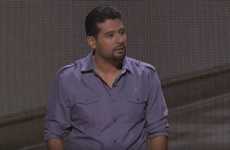
Need Inspiration?
Get inspired by 4,000+ keynote speaker videos & our founder, a top keynote speaker on innovation.
Elizabeth Wight's Talk on Hunger Shows How Poverty Isn't Always Easy to See
Riley von Niessen — November 4, 2017 — Keynote Trends
Elizabeth Wight, the CEO of Interfaith Ministries, begins her talk on hunger by telling her audience about a time in her life when she was struggling as a single mother to support her family on minimum wage from a part-time job.
During this time, she was under extreme stress, and there were days when she only ate the remaining food on her childrens' plates. Due to the combination of stress, a lack of a healthy and full diet, and near exhaustion, Wight developed an autoimmune disease that affected her as well. Despite all of this, she was able to keep up appearances. Luckily, she had a family who was able to offer her support when she needed it the most. As Wright shows with her story, it's not always easy to see when someone is struggling, and that having a support system is vital to moving forward.
Wight continues her talk on hunger by considering the many different ways that poverty is exploited to make people care about it, which is often referred to as "poverty porn." The problem with using highly particular and exaggerated imagery is that it can lead to a disconnect in how it's perceived, and a lack of understanding for those who are dealing with it within the US. Another issue that Wight brings up is a lack of data when it comes to poverty rates, which make it difficult to offer a simple solution. In addition, many people have the idea ingrained that to be truly hungry or impoverished, a person has to be incredibly thin, which can lead to a lack of sympathy towards those who don't fit this mold.
By considering the barriers to helping those in need, Wight shows her audience how they can broaden their perspectives, so that they can offer support within their communities.
During this time, she was under extreme stress, and there were days when she only ate the remaining food on her childrens' plates. Due to the combination of stress, a lack of a healthy and full diet, and near exhaustion, Wight developed an autoimmune disease that affected her as well. Despite all of this, she was able to keep up appearances. Luckily, she had a family who was able to offer her support when she needed it the most. As Wright shows with her story, it's not always easy to see when someone is struggling, and that having a support system is vital to moving forward.
Wight continues her talk on hunger by considering the many different ways that poverty is exploited to make people care about it, which is often referred to as "poverty porn." The problem with using highly particular and exaggerated imagery is that it can lead to a disconnect in how it's perceived, and a lack of understanding for those who are dealing with it within the US. Another issue that Wight brings up is a lack of data when it comes to poverty rates, which make it difficult to offer a simple solution. In addition, many people have the idea ingrained that to be truly hungry or impoverished, a person has to be incredibly thin, which can lead to a lack of sympathy towards those who don't fit this mold.
By considering the barriers to helping those in need, Wight shows her audience how they can broaden their perspectives, so that they can offer support within their communities.
0.9
Score
Popularity
Activity
Freshness
















